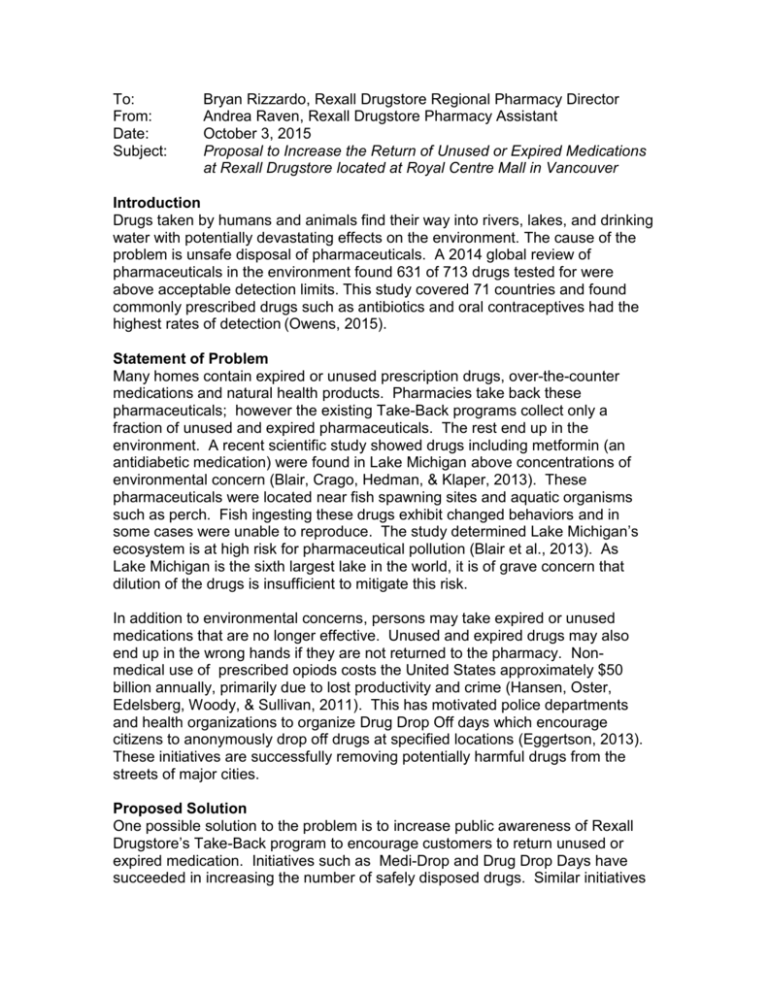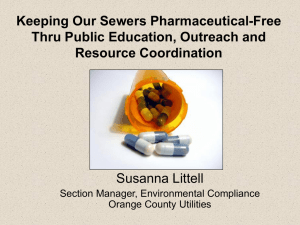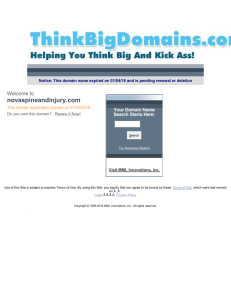301 Andrea Raven Edited Formal Report Proposal
advertisement

To: From: Date: Subject: Bryan Rizzardo, Rexall Drugstore Regional Pharmacy Director Andrea Raven, Rexall Drugstore Pharmacy Assistant October 3, 2015 Proposal to Increase the Return of Unused or Expired Medications at Rexall Drugstore located at Royal Centre Mall in Vancouver Introduction Drugs taken by humans and animals find their way into rivers, lakes, and drinking water with potentially devastating effects on the environment. The cause of the problem is unsafe disposal of pharmaceuticals. A 2014 global review of pharmaceuticals in the environment found 631 of 713 drugs tested for were above acceptable detection limits. This study covered 71 countries and found commonly prescribed drugs such as antibiotics and oral contraceptives had the highest rates of detection (Owens, 2015). Statement of Problem Many homes contain expired or unused prescription drugs, over-the-counter medications and natural health products. Pharmacies take back these pharmaceuticals; however the existing Take-Back programs collect only a fraction of unused and expired pharmaceuticals. The rest end up in the environment. A recent scientific study showed drugs including metformin (an antidiabetic medication) were found in Lake Michigan above concentrations of environmental concern (Blair, Crago, Hedman, & Klaper, 2013). These pharmaceuticals were located near fish spawning sites and aquatic organisms such as perch. Fish ingesting these drugs exhibit changed behaviors and in some cases were unable to reproduce. The study determined Lake Michigan’s ecosystem is at high risk for pharmaceutical pollution (Blair et al., 2013). As Lake Michigan is the sixth largest lake in the world, it is of grave concern that dilution of the drugs is insufficient to mitigate this risk. In addition to environmental concerns, persons may take expired or unused medications that are no longer effective. Unused and expired drugs may also end up in the wrong hands if they are not returned to the pharmacy. Nonmedical use of prescribed opiods costs the United States approximately $50 billion annually, primarily due to lost productivity and crime (Hansen, Oster, Edelsberg, Woody, & Sullivan, 2011). This has motivated police departments and health organizations to organize Drug Drop Off days which encourage citizens to anonymously drop off drugs at specified locations (Eggertson, 2013). These initiatives are successfully removing potentially harmful drugs from the streets of major cities. Proposed Solution One possible solution to the problem is to increase public awareness of Rexall Drugstore’s Take-Back program to encourage customers to return unused or expired medication. Initiatives such as Medi-Drop and Drug Drop Days have succeeded in increasing the number of safely disposed drugs. Similar initiatives could encourage more customers to return unused or expired pharmaceuticals to Rexall Drugstore. The benefits of this proposed solution include: Reducing the amount of pharmaceuticals available in homes for possible diversion and accidental poisonings Identifying unused pharmaceuticals to inform prescribing practices Increasing awareness of safe storage and disposal practices Reducing the environmental impact associated with improper disposal of pharmaceuticals in the garbage and sewer system Scope To increase the number of returned, unused or expired pharmaceuticals, I plan to pursue the following areas of inquiry: What is the current rate of return of unused or expired pharmaceuticals? What is stopping people from returning all of their unused or expired medications? What are ways to increase consumer awareness of Rexall Drugstore’s Take-Back Program? What is the feasibility of initiating a Drug Drop Day or Medi-Drop at Rexall Drugstore? What are the costs associated with these initiatives? Methods My primary data sources will include pharmacists that I work with, including my pharmacy manager Framin Mark, and surveys of our current customers. I will also investigate the Take-Back programs of other pharmacies to compare them to ours. Secondary sources will include peer-reviewed articles on the effects of unsafe drug disposal. I will also research initiatives to address this problem. My Qualifications I have been working as a pharmacy assistant at Rexall Drugstore in Vancouver for one and one-half years. Prior to that I worked for a community pharmacy in Langley. I studied pharmacology during my undergraduate years, which combined with my work experience has given me a solid understanding of drug properties. My studies in ecology made me aware of and interested in mitigating environmental hazards. Conclusion It is clear that action is necessary to remove harmful pharmaceuticals from the environment. The National Association of Pharmacy Regulatory Authorities (NAPRA) has published Model Standards of Practice for Canadian Pharmacies, including ensuring safe, legal, and environmentally sound disposal of medications. Accepting this proposal will show that Rexall Drugstore strongly supports NAPRA’s standards for the disposal of unused or expired pharmaceuticals. Works Cited Blair, B.D., Crago, J.P., Curtis, J.H., & Klaper, R.D. (2013). Pharmaceuticals and personal care products found in the Great Lakes above concentrations of environmental concern. Chemosphere. 93: 2116-2123. Eggertson, L. (2013). Prescription drug drop-off day in Ontario. Canadian Medical Association Journal. 185(10): E469. Hansen, R.N., Oster, G., Edelsberg, J., Woody, G.E., & Sullivan, S.D. (2011). Economic Costs of Nonmedical Use of Prescription Opioids. The Clinical Journal of Pain. 27(3): 194-202. Owens, B. (2015). Pharmaceutical in the environment: a growing problem. The Pharmaceutical Journal. 294(7850).




